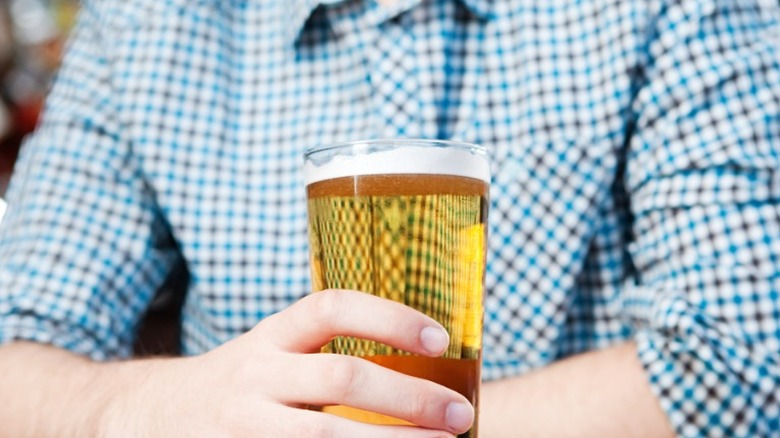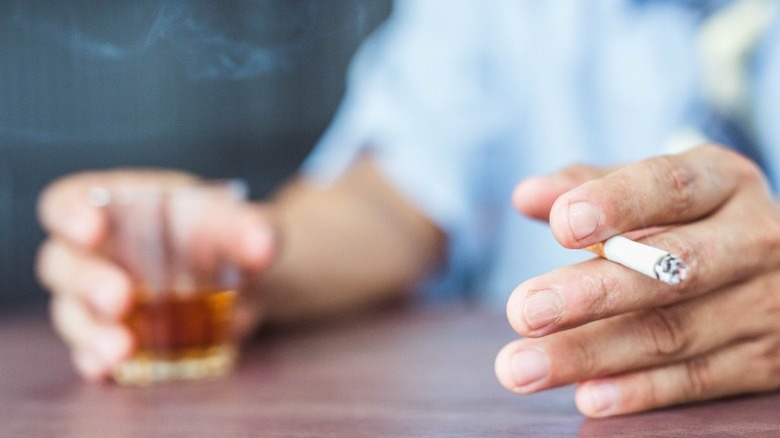What Happens To Your Body If You Mix Alcohol And Tobacco
Tobacco and alcohol are two popular drugs that some people take together. Each drug affects the body in particular ways, so you may wonder what happens when you use them at the same time.
Tobacco is a plant native to the Americas that is processed for its leaves. Once dried, tobacco leaves can be made into a variety of products like cigars, cigarettes, chewing tobacco, and snuff (per National Institute on Drug Abuse). The key substance in tobacco products is nicotine, an addictive chemical. Notably, more recent products utilize nicotine in things like electronic cigarettes and nicotine oral pouches and lozenges. Nicotine affects the brain and body. It prompts the release of adrenaline and stimulates the central nervous system, which in turn can increase your heart rate, breathing, and even blood pressure. This stimulation of the central nervous system is often associated with the buzzed feeling that nicotine consumption can cause. Nicotine also affects the brain by triggering dopamine, which may also play a role in its addictive properties.
According to the American Lung Association, the side effects of nicotine include anxiety, dizziness, headache, loss of appetite, nausea, tremor, or vomiting. Notably, tobacco use can increase the risk of developing lung cancer, mouth cancer, and other respiratory diseases.
How does alcohol affect the body?
Alcohol is the result of a fermentation process of starches, sugar, and yeast. Alcohol can be found in beverages like beer, wine, and liquor (per Centers for Disease Control and Prevention). Alcohol has a far-reaching effect on the body and can impact most organs, since it enters the bloodstream via the stomach and small intestine and is then able to circulate around the body. It is a central nervous system depressant that slows the pace of your brain activity, per MedlinePlus. Since alcohol is processed in the liver, excessive alcohol use can negatively impact liver health. Alcohol use can also increase the risk of mouth or throat cancer.
While everyone has different levels of tolerance for alcohol, drinking it can lead to feelings of intoxication. As you get drunk, your blood vessels start to dilate, which can give you a false sense of feeling warm, even though you are actually losing body heat. Alcohol's affect on the brain can also lead to loss of motor skills, slurred speech, slower reaction time, and bad decision-making.
Risks of mixing alcohol and tobacco
According to the National Institute on Alcohol Abuse and Alcoholism, people who drink alcohol are more likely to smoke tobacco, and vice versa. In fact, use of tobacco is associated with use of alcohol. For example, people who are dependent on alcohol are three times more likely to smoke tobacco, and people who are dependent on tobacco are four times more likely to be dependent on alcohol. This may have to do with the fact that both alcohol and tobacco trigger brain systems and neurochemicals like the dopaminergic system. When taken together, alcohol and tobacco can make the experience more pleasurable.
The American Addiction Centers notes both short-term and long-term effects of drinking and smoking. Since alcohol is a nervous system depressant and tobacco is a stimulant, their effects on the body can be masked by one another, which might cause you to drink more than you normally would. In the long-term, drinking and smoking can take a toll in your health and increase your risk of developing conditions such as throat and esophageal cancer. Incredibly, alcohol may break down cancerous chemicals from tobacco smoke in the throat's tissues, making these chemicals more likely to hang around and get stuck in the throat tissue.
Altogether, if you have a habit of consuming alcohol and tobacco at the same time, you might want to think twice.



